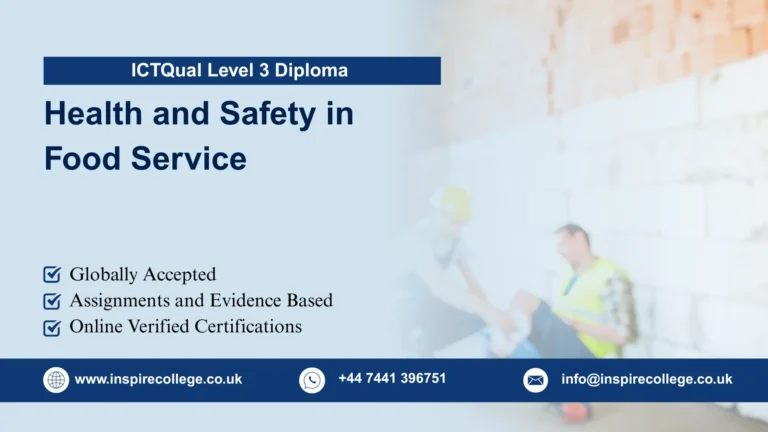
ICTQual Level 3 Diploma in Process Safety Management
In today’s high-risk industrial environments—whether in oil and gas, chemical processing, manufacturing, or energy—process safety management (PSM) is a vital discipline. Organizations must protect people, assets, and the environment from hazardous incidents. The ICTQual Level 3 Diploma in Process Safety Management is a professionally recognized, assignment-based qualification designed to equip professionals with the practical skills and regulatory knowledge required to manage process safety effectively.
Whether you’re already working in operations, HSE, or looking to advance into a safety-critical role, this diploma provides a strong foundation in identifying, controlling, and mitigating industrial process risks.
The ICTQual Level 3 Diploma is a vocational qualification developed to support professionals in understanding and applying the core principles of process safety across a range of high-hazard industries. Unlike traditional exam-based programs, this course is assignment-led, offering real-world assessments, case studies, and scenario-based tasks that reinforce applied learning.
Learners typically complete the course in 3 to 6 months, depending on personal pace and work commitments. The assignment-based structure enables flexible learning, allowing learners to progress while applying knowledge directly to real workplace challenges.
With workplace safety and environmental compliance under increasing global scrutiny, qualified process safety professionals are in high demand. The ICTQual Level 3 Diploma in Process Safety Management offers a credible, flexible, and practical route to certification and career growth.
Ready to enroll? Contact an approved ICTQual training provider today to learn more about course fees, schedules, and support options.
- Minimum Age: Applicants must be 18 years or older at the time of enrollment.
- Educational Background:
- A high school diploma, GCSEs, or a Level 2 qualification in a relevant field (e.g., Occupational Health & Safety, Engineering, Chemical Process Technology) is beneficial, though not mandatory.
- Literacy and Numeracy Skills:
- Learners should possess basic reading, writing, and mathematical skills to understand course content and complete assignments effectively.
- English Language Proficiency:
- As the course is delivered in English, candidates should have a good command of the English language to follow instruction, participate in discussions, and submit written assessments.
These requirements ensure learners can successfully engage with the assignment-based curriculum and apply safety management principles in real-world industrial environments.
Mandatory Units
The ICTQual Level 3 Diploma in Process Safety Management qualification consists of 6 units .
Mandatory Units
- Introduction to Process Safety Management
- Hazard Identification and Risk Assessment
- Safety Management Systems
- Process Hazard Analysis
- Emergency Response Planning
- Regulatory Framework and Compliance
Learning Outcomes for the Study Units:
Introduction to Process Safety Management
- Understanding of Process Safety: Gain a clear understanding of the concept of process safety management and its significance in industrial operations.
- Knowledge of Historical Incidents: Learn from historical incidents and understand the lessons learned to prevent similar occurrences in the future.
- Familiarity with Regulatory Frameworks: Acquire knowledge of the regulatory frameworks and standards governing process safety to ensure compliance within organizations.
Hazard Identification and Risk Assessment
- Hazard Identification Skills: Develop the ability to identify potential hazards associated with industrial processes, including chemical, mechanical, and environmental hazards.
- Risk Assessment Proficiency: Acquire skills in conducting risk assessments using various methodologies such as HAZID, HAZOP, and FMEA to prioritize risks effectively.
- Implementation of Risk Controls: Learn how to implement controls and safeguards to mitigate identified risks and prevent incidents from occurring.
Safety Management Systems
- Design and Implementation of SMS: Gain the expertise to design and implement robust safety management systems tailored to the specific needs and complexities of industrial processes.
- Promotion of Safety Culture: Understand the importance of fostering a strong safety culture within organizations and learn strategies for promoting safety leadership and employee engagement.
- Continuous Improvement: Learn how to establish processes for continuous improvement of safety management systems through audits, evaluations, and feedback mechanisms.
Process Hazard Analysis
- Proficiency in PHA Techniques: Develop proficiency in various process hazard analysis (PHA) techniques such as HAZOP, What-If analysis, and Layers of Protection Analysis (LOPA) to identify and mitigate potential hazards.
- Human Factors Awareness: Gain an understanding of the role of human factors in process safety and learn how to integrate human factors considerations into hazard analysis processes.
- Application of PHA Results: Learn how to effectively apply the results of process hazard analyses to improve safety practices and procedures within industrial processes.
Emergency Response Planning
- Development of Emergency Response Plans: Acquire the skills to develop comprehensive emergency response plans that outline procedures for responding to incidents effectively and minimizing their impact.
- Incident Command Systems (ICS): Understand the principles of incident command systems (ICS) and learn how to establish effective command structures during emergencies.
- Communication and Coordination: Learn how to facilitate effective communication and coordination among stakeholders during emergency response efforts to ensure a timely and organized response.
Regulatory Framework and Compliance
- Understanding of Regulatory Requirements: Gain a thorough understanding of the legal and regulatory requirements related to process safety, including relevant OSHA regulations and process safety management (PSM) standards.
- Compliance Management: Learn strategies for ensuring compliance with regulatory requirements and maintaining up-to-date documentation and records to demonstrate compliance.
- Integration of Regulatory Requirements: Understand how to integrate regulatory requirements into safety management systems and operational practices to ensure a comprehensive approach to compliance.
The ICTQual Level 3 Diploma in Process Safety Management is designed for individuals working in—or aspiring to work in—industries where managing hazardous processes and operational safety is critical. This assignment-based qualification is ideal for those seeking practical, career-oriented training in process safety principles.
- Health and Safety Officers looking to specialize in process safety within high-risk sectors
- Process Technicians and Plant Operators responsible for maintaining safety in industrial operations
- Engineers and Technical Staff in chemical, oil & gas, manufacturing, and energy industries
- Supervisors and Team Leaders overseeing production and maintenance activities
- Compliance and Risk Management Professionals needing formal training in hazard identification and control
- Early-career professionals or career changers with some industrial experience who wish to develop safety-specific expertise
Whether you’re aiming to enhance your safety credentials or transition into a more specialized safety management role, this diploma provides a structured, applied pathway to career advancement in process-intensive industries.
Register Now
FAQs for ICTQual Level 3 Diploma in Process Safety Management






